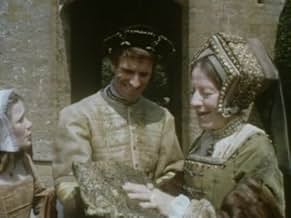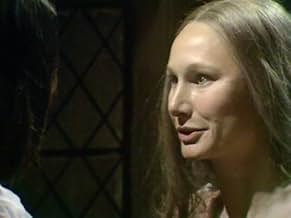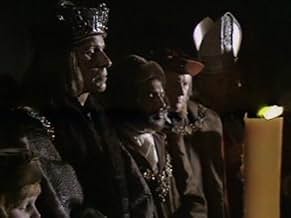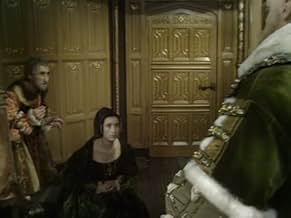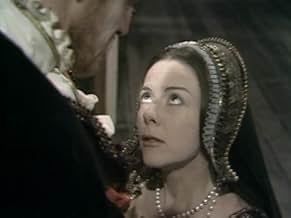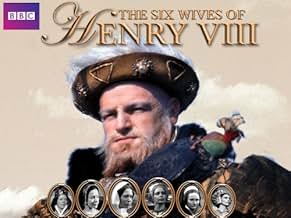The Six Wives of Henry VIII
- Minissérie de televisão
- 1970
- 9 h
AVALIAÇÃO DA IMDb
8,4/10
1,5 mil
SUA AVALIAÇÃO
Adicionar um enredo no seu idiomaA six-episode dramatization of Henry VIII's relationships with each of his six wives. Each episode is devoted to one wife, and is a complete play in itself.A six-episode dramatization of Henry VIII's relationships with each of his six wives. Each episode is devoted to one wife, and is a complete play in itself.A six-episode dramatization of Henry VIII's relationships with each of his six wives. Each episode is devoted to one wife, and is a complete play in itself.
- Ganhou 1 Primetime Emmy
- 7 vitórias e 8 indicações no total
Explorar episódios
Avaliações em destaque
This was one of the most amazing pieces of television/theater. I was 17 when I watched it for the first time and about 10 years ago, acquired the miniseries on VHS. Just recently I was given the DVD set as a gift. I've been re-watching it and I marvel at just how amazing the production and the performances were. At the time Keith Michell played Henry, the actor was in his early 40's yet managed to portray the monarch from age 18 till his death at 56. Simply remarkable and I think Michell is the consummate Henry VIII. As the previous poster, my favorite episodes were Anne Boleyn and Catherine Howard; I didn't know Ms. Pleasence was Donald Pleasance's daughter. I also enjoyed Annette Crosbie's performance; she also portrayed Queen Victoria in the miniseries about Edward VII. All in all, this is one of the finest miniseries ever done on television and I doubt we'll see its equal anytime soon.
This is a set I'd love to own. The costumes are great, and acting is even greater, especially Keith Michel. He brings real depth to Henry and we see him as the interesting, complex man that he was, not just the selfish, bloated glutton of his later years. The court intrigue and politics, and also the costumes are expertly presented and you get a real feel for the times. The only flaw was that the actresses were generally too old for the parts they played, but there aren't many young actresses of this caliber, so one has to suspend disbelief and just enjoy the show. If I had to choose the best performance of the wives, I'd choose Annette Crosbie as Catherine of Aragon.
This series - and can you imagine the BBC financing and supporting a nine-hour historical drama series these days? - focuses on one of the six wives each episode, an interesting approach which comes off better in some instalments than others. Still, what is here is excellent - and far better than the ridiculously truncated film which followed a few years later.
Keith Michell as Henry. What more can I add to the praise which has already been put forward? He is excellent in every episode; we see Henry as a complex character who at times can cause us to sympathise with his predicament. The writing of this series is tight and believable, and the supporting characters are solid. This always helps move a series along when many supporting players are there throughout. Of particular note are Patrick Troughton as Norfolk, Bernard Hepton as Cranmer, and Sheila Burrell as Lady Rochford.
Of the six wives, all are excellent in their own ways. Katherine of Aragon's story is rushed, but Annette Crosbie does her best and is both memorable and pathetic ... Dorothy Tutin as Anne Boleyn is more fiery but the trial scene is truly regal and gives a different perspective ... Anne Stallybrass as Jane Seymour is sweet, pious, and just a little bit cunning (and that episode, largely in flashback as Jane lies sick to death at her son's christening, is well done) ... Elvi Hale as Anne of Cleves is extremely convincing, and her episode is full of intrigue ... Catherine Howard, as played by Angela Pleasance, is all gloss and no substance, but you still feel for her as she goes headlong to her fate without recognition ... and Rosalie Crutchley as Katharine Parr is a dull old crow in black, widow of old men, who at first resents her lot and then comes to respect and love the sick king.
This series really is remarkable. I would never get bored watching it - and eventually, it led to another top-class BBC drama, Elizabeth R, using some of the same cast and moving the story through the reigns of Edward VI, Mary I, and Elizabeth I herself.
Keith Michell as Henry. What more can I add to the praise which has already been put forward? He is excellent in every episode; we see Henry as a complex character who at times can cause us to sympathise with his predicament. The writing of this series is tight and believable, and the supporting characters are solid. This always helps move a series along when many supporting players are there throughout. Of particular note are Patrick Troughton as Norfolk, Bernard Hepton as Cranmer, and Sheila Burrell as Lady Rochford.
Of the six wives, all are excellent in their own ways. Katherine of Aragon's story is rushed, but Annette Crosbie does her best and is both memorable and pathetic ... Dorothy Tutin as Anne Boleyn is more fiery but the trial scene is truly regal and gives a different perspective ... Anne Stallybrass as Jane Seymour is sweet, pious, and just a little bit cunning (and that episode, largely in flashback as Jane lies sick to death at her son's christening, is well done) ... Elvi Hale as Anne of Cleves is extremely convincing, and her episode is full of intrigue ... Catherine Howard, as played by Angela Pleasance, is all gloss and no substance, but you still feel for her as she goes headlong to her fate without recognition ... and Rosalie Crutchley as Katharine Parr is a dull old crow in black, widow of old men, who at first resents her lot and then comes to respect and love the sick king.
This series really is remarkable. I would never get bored watching it - and eventually, it led to another top-class BBC drama, Elizabeth R, using some of the same cast and moving the story through the reigns of Edward VI, Mary I, and Elizabeth I herself.
Impeccable in casting, sets, dialogue, and period feel. All of the principals are magnificent; but the actors who play Stephen Gardiner and Robert Barnes are simply extraordinary. The much-maligned Keith Michell is still the best Henry this century, easily brushing aside Robert Shaw, Richard Burton, and Charles Laughton. Michell's combination of vanity, insecurity, overweening machismo, and determination to stay top dog at all costs is painful but fascinating to watch. This TV series does full justice to all facets of the Tudor period; best of all, it reveals extra magical touches with each re-viewing. Which means, in short, that this is a video which you should buy, rather than rent.
This is a fictionalized biography of England's interesting, overrated and matrimonially challenged monarch of the early sixteenth century. The Renaissance--secularism, self-assertion, democratic elections and the relegation of otherworldism--had been introduced as a set of ideas negative to church-worldly theocracy in 1470 by Edward IV. Henry VIII's era's nobles then followed a fashion set by him; female costume was thin, confining, geometric and dull. Henry's male costume was broad, fur-bearing, opulent and increasingly Italianate. His life and times became a struggle between Medieval statism and individualist Renaissance priorities. The series is titled for the "six wives" he married; but an equal amount of time is spent on Henry's stormy reign. The six wives are "Catherine of Aragon" (Annette Crosbie; "Anne Boleyn" (Dorothy Tutin); "Jane Seymour" (Anne Stallybrass); "Anne of Cleves" (Elvi Hale); "Catherine Howard" (Angela Pleasance, aka Angela Scoular); and "Catherine Parr" (Rosalie Crutchley). The assessment of a nine-hour-long series of such complexity as English history, examples of acting, directing, staging, writing, political theory and psychology is a difficult assignment. It is on the grounds of separate evaluations of these aspects that I say one must approach the series. Henry begins as a conformist but Renaissance-loving youth of unusual promise; by the end of the series he has become a bloated and totalitarian monster. He has wasted the kingdom's exchequer in continental wars and on Medieval-style pageants and tournaments; and his neglect of justice and bequeathing of his kingdom to Bloody Mary Tudor, a Catholic, nearly undoes his life's great achievement, the removal of Catholic influence and monastic structures from England, for good or ill. The presentation of events, personalities, ideas and history here I regard as above-average in sum; at times, one feels one is watching realpolitik coming to life before one's eyes. The physical production is above average though seldom either sumptuous or grand; the richest part of the series is its costumes. The directors bring good performances out of many actors; blocking of action, gestures and scenic elements are always quite high-level, I find. Psychologically, the difficulty in such a six-episode coherently-arranged ninety-minute-each mini-series is to try to make the motivations and reactions appeal to late twentieth-century viewers. The writers of the episodes had varying material to work with, and for the most part handled both historicity as well as psychology with requisite skill, I suggest. The dialogue about political as well as personal consequences in most cases remains interesting, and rather well-handled, by my standards. 1. Catherine of Aragon. This is a rather well-written story which telescopes years of time, from the early marriage of Henry, then a prince, to his brother's affianced wife after his death to the ending of their quarrel after early happiness when Henry divorces himself from her and Catholicism. Annette Crosbie is miscast as a Spanish noblewoman but acts rather creditably throughout the episode. 2. Anne Bolyen. Less time is covered in this episode than in the first, and some backtracking is necessary since the same events are covered from Anne Bolyen's point of view the second time. I find the dialogue and story-line and acting to be the best in this Nick McCarty script of all the series' entries. Dorothy Tutin and Wolfe Morris are excellent in this episode even though she is a bit too old for the part. The highlight is the trial scenes that end with Anne's unjust murder. 3. Jane Seymour. I consider this the weakest of the scripts, although Anne Stallybrass is an effectively tragic figure; Bernard Hepton as Cranmer comes to the fore in this episode as a most effective presence. 4. Anne of Cleves. This charming and very-well-reasoned episode presents Elvi Hale as a delightful and occasionally merry prospective bride for an aging Henry; she became a world-class presence due to this intelligently written part. 5. Catherine Howard. Anglela Pleasence is quite good in this part though neither quite beautiful nor highly-charismatic; she deserved more work off this interesting effort. The script is a strong one, especially in dialogue; and the viewer is given the sense from the beginning that this is a monarch of whom men dare not run afoul. A moving and complex piece of television writing and well-acted, the episode shows that even the mighty Howard family is not impervious to Henry's danger. 6. Catherine Parr. Another episode that telescopes time. Enorrmous by now and dangerous, Henry has become the shadow of what he was; one fears for Rosalie Crutchley, the kindly woman who brightens his last years, for a climate where truth cannot be uttered is no England for honest men, male or female. One must begin any evaluation of the series with with Keith Michell as Henry Tudor. His performance is extraordinarily good, much better than anyone else's in the part has been of which I have knowledge. By playing Henry straight, Michell gave him time to become deviant--in reasoning, willful blindness, denial, cruelty and injustice--by slow degrees. Among the many other actors involved, Sheila Burrell, Christopher Hancock, Patrick Troughton and Zienia Merton among others deserve mention. A landmark when it was produced, the series has only grown in stature since it was first presented.
Você sabia?
- CuriosidadesKeith Michell was one hundred eighty-eight centimeters (six feet one inch) tall, the same height as the real Henry VIII.
- ConexõesFeatured in The 24th Annual Primetime Emmy Awards (1972)
Principais escolhas
Faça login para avaliar e ver a lista de recomendações personalizadas
- How many seasons does The Six Wives of Henry VIII have?Fornecido pela Alexa
Detalhes
- Data de lançamento
- País de origem
- Idioma
- Também conhecido como
- Die sechs Frauen Heinrich VIII
- Empresa de produção
- Consulte mais créditos da empresa na IMDbPro
Contribua para esta página
Sugerir uma alteração ou adicionar conteúdo ausente

Principal brecha
By what name was The Six Wives of Henry VIII (1970) officially released in India in English?
Responda
